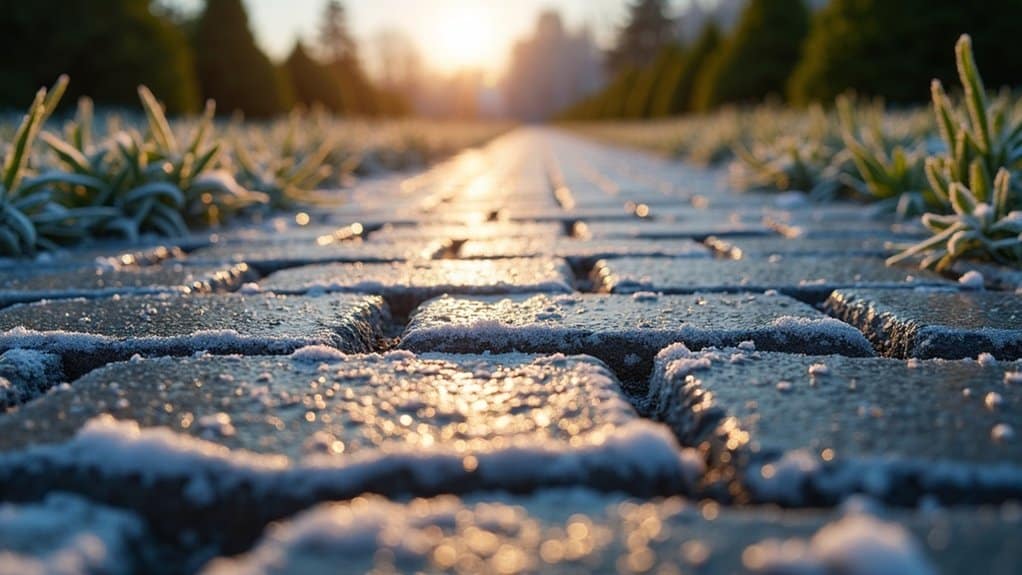Resin-bound gravel stands up brilliantly to British winters, handling both frost and ice with ease. The material won’t crack during freeze-thaw cycles, and its flexible nature means it expands and contracts safely as temperatures shift. When laid properly, it allows water to drain through, which helps prevent ice patches forming on the surface – particularly useful for domestic driveways and paths. Unlike traditional gravel or concrete, it stays firmly in place through the coldest months whilst maintaining its smart appearance. The surface remains stable and safe underfoot, even in challenging weather conditions.
Key Takeaways
Resin-bound gravel stands up remarkably well to British winters. The resin’s flexible properties mean it won’t crack when temperatures drop below freezing, unlike traditional concrete surfaces.
The secret lies in the material’s natural elasticity – it expands and contracts with the weather, much like a rubber band. However, proper installation is vital; the surface must be laid in dry conditions to ensure it performs well against frost.
High-quality polyurethane resins maintain their flexibility even in the coldest snaps, making them ideal for UK driveways and paths. Think of it as wearing a proper winter coat – it adapts to the conditions while protecting what’s underneath.
To keep the surface safe during icy spells, regular maintenance is key. The textured finish provides good grip underfoot, particularly important during those frosty morning walks to the car.
Understanding Resin-Bound Gravel
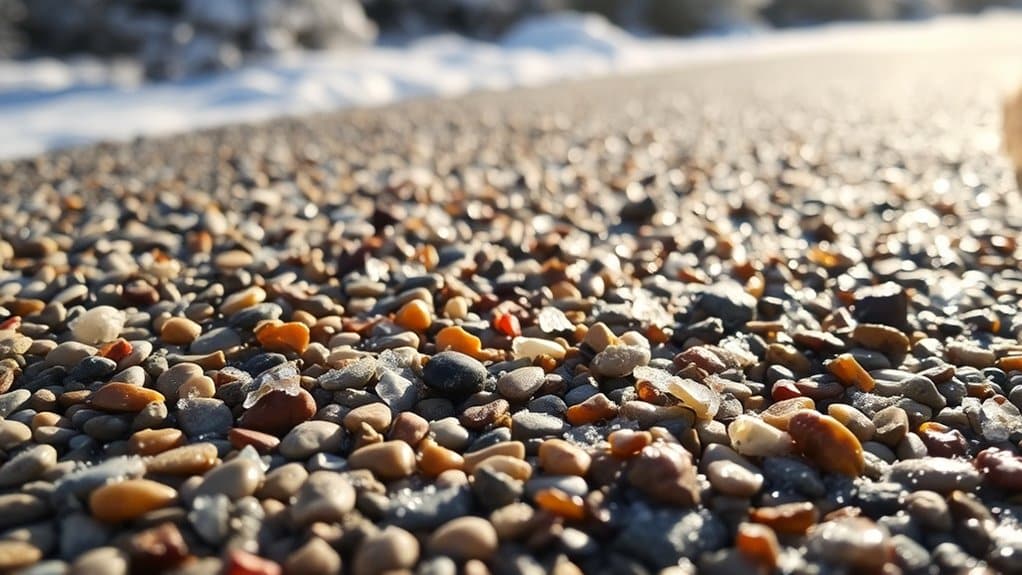
Resin-bound gravel pairs natural stone with tough, UV-stable resin to create lasting, attractive surfaces.
The resin acts like glue, holding the stones together whilst keeping a grippy, water-permeable finish – think of it as a sturdy sponge for your driveway or patio. The size and shape of stones matter quite a bit; smaller, angular stones pack together better and drain more effectively than larger, round ones. You won’t find puddles forming as easily as with concrete or tarmac, and it stays surprisingly slip-free even during frosty British winters. Additionally, resin-bound gravel’s durability ensures it can withstand extreme cold temperatures without cracking or breaking. This is due to the chemical bonds that create tough surfaces, allowing it to maintain its integrity even in harsh weather conditions. Getting the installation right is vital – too dense and water won’t drain, too loose and it’ll fall apart. Different resin types work better in various weather conditions, with some specially designed for our cold, damp climate. It’s a brilliant option for driveways, paths and garden areas where you want both good looks and practical benefits.
Durability and Weather Resistance
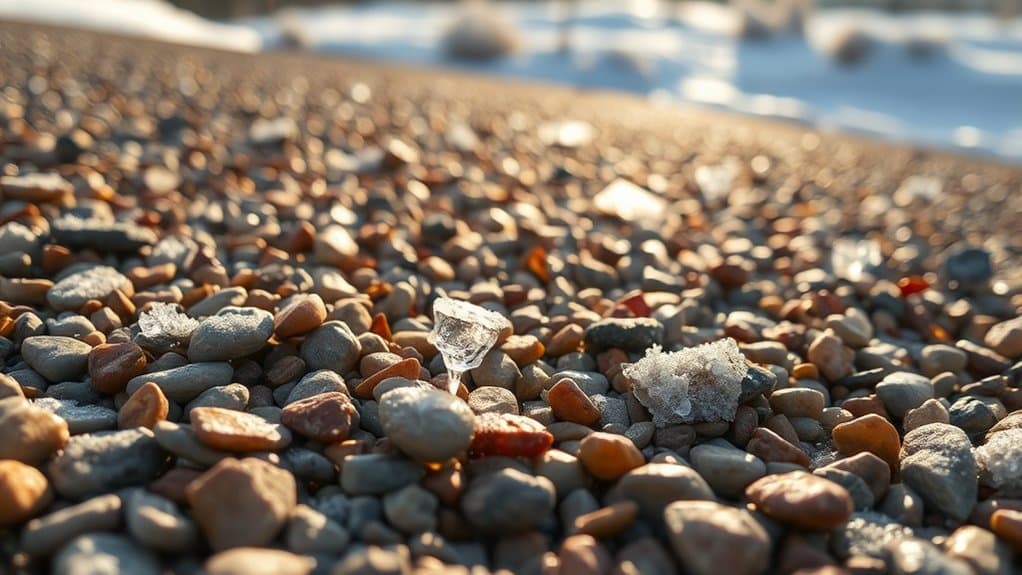
The exceptional durability of resin-bound gravel makes it a standout choice for British weather conditions. Its robust structure combines premium resins with selected aggregates to create a surface that handles everything from heavy rain to frost. Proper skilled resin installation ensures that the surface can withstand the unique challenges presented by cold climates, and its low maintenance requirements contribute to its overall appeal.
| Feature | Benefit |
|---|---|
| Porous Design | Handles British rainfall effectively |
| Freeze-Thaw Resistance | Prevents winter damage and cracking |
| Long Lifespan | 20+ years with basic maintenance |
| High-Quality Resin Systems | Maintains colour and resists spillages |
When properly laid, the resin’s flexibility allows natural ground movement without damage – particularly useful during seasonal temperature changes. These practical features ensure your driveway remains sturdy and attractive throughout the UK’s varied weather patterns.
How Resin-Bound Gravel Handles Freezing Temperatures
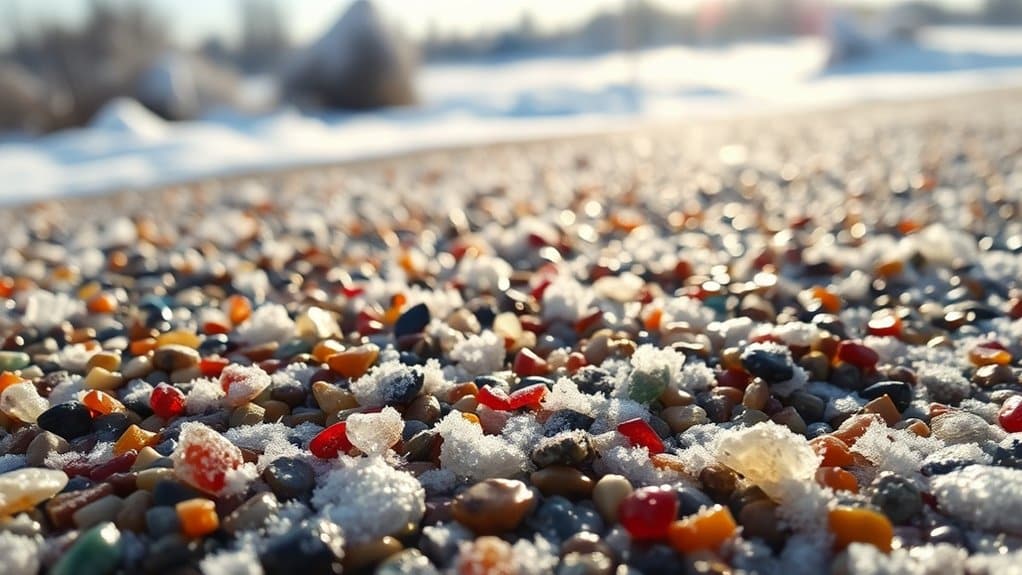
Resin-bound gravel performs remarkably well in British winter conditions, thanks to its robust freeze-thaw resistance. Much like how a garden path needs proper foundations, this surface requires expert installation with adequate drainage to prevent water pooling and potential frost damage. The material’s flexibility allows it to expand and contract with temperature changes – rather like a quality rubber seal – which helps prevent cracking during cold snaps. Additionally, wet surfaces can hinder proper adhesion, so ensuring a dry installation environment is crucial for longevity. The secret lies in proper groundwork and mixing ratios. A professionally laid resin-bound surface should last through countless British winters without significant wear, though it’s worth noting that particularly harsh conditions might need a bit more attention, especially around high-traffic areas.
For best results in freezing weather:
- Ensure proper drainage from the start
- Use high-quality UV-stable resin
- Install at the correct depth
- Keep the surface clean and free from debris. Regular maintenance, including brushing to clear debris, will significantly enhance the durability of the surface.
Freeze-Thaw Resistance Properties
Resin-bound gravel offers excellent resistance to frost and freezing, which is particularly valuable for British weather conditions.
The resin’s flexible nature means it can expand and contract as temperatures change, much like a rubber band, preventing cracks and damage.
The surface’s porous structure lets water drain away quickly, reducing puddles that could freeze and cause problems.
Quality resins are specially formulated to stay elastic, helping the surface cope with repeated freezing and thawing – think of how your garden path might crack in winter, whilst resin-bound surfaces stay intact.
When properly installed and cured, these surfaces handle cold snaps without breaking up or lifting.
For UK homeowners and businesses, this means a winter-proof surface that stays safe and looks good year after year.
Installation Techniques for Durability
Essential installation steps for durable resin-bound gravel in cold weather:
Start with a solid base – concrete or tarmac works best – making sure it’s clean and stable to stop any movement.
Pack down and level carefully to prevent dips when frost hits. Only lay when it’s warmer than 5°C and never in the rain, much like painting your garden fence.
Mix the resin and aggregate exactly as specified (think baking – the measurements matter), and choose frost-resistant resin.
Spread evenly and compress thoroughly to remove air pockets, just as you’d when laying paving.
Secure all edges properly – this stops frost pushing up the sides, similar to how garden borders protect flower beds.
Use proper tools for a smooth finish. These steps are crucial for a surface that’ll handle British winters without trouble.
The Role of Polyurethane Resin in Frost Resistance
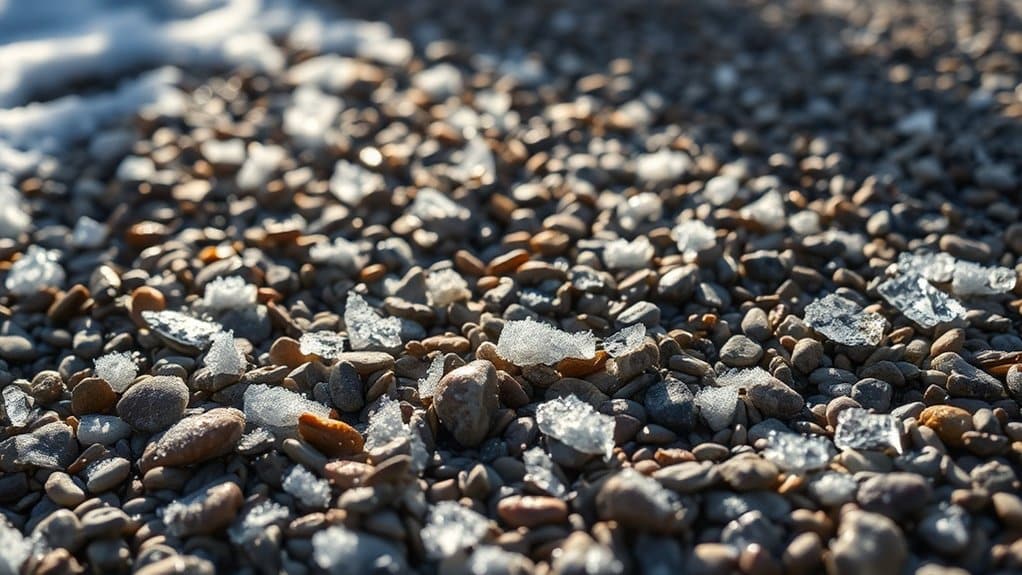
Polyurethane resin offers remarkable frost resistance whilst many other materials fail in icy conditions. Its unique properties help prevent frost damage, making it highly reliable across various applications.
The key benefits include:
- Low-Temperature Flexibility: The resin stays flexible in temperatures as low as -29°C, much like a rubber band that doesn’t become brittle in your freezer. This prevents cracking during British winter freeze-thaw cycles.
- Mechanical Strength: Think of it as a shock absorber – it handles the impact of frozen debris without breaking, particularly useful for outdoor installations and winter-exposed surfaces.
- Chemical Stability: The material maintains its strength against road salt, grit and other winter contaminants common on UK roads and pathways.
This combination of properties makes polyurethane resin particularly suited to British weather conditions, where temperatures frequently hover around freezing and materials face constant moisture exposure.
Drainage Capabilities of Resin-Bound Gravel
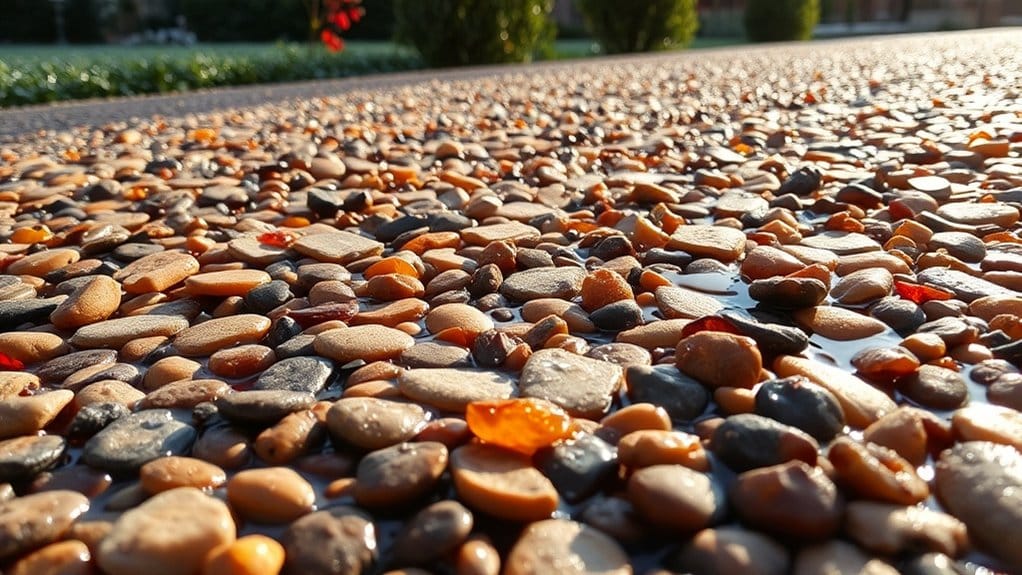
Resin-bound gravel is a brilliant drainage solution for UK gardens and driveways. The surface works like a sponge, with small gaps between stones letting rainwater seep through naturally. This means no more puddles on your driveway, even during those typical British downpours.
The system works best when properly installed with the right stone size and a solid sub-base – think of it like building layers of a cake, each layer playing its part. A slight slope helps guide water away effectively, much like a well-designed garden path.
The drainage capabilities tick all the boxes for UK building regulations (SuDS), whilst helping top up local groundwater levels. It’s particularly useful in areas prone to flooding, such as coastal regions or low-lying towns.
To keep it working properly, just sweep regularly and clear any debris. A well-maintained resin-bound surface can handle whatever the British weather throws at it, protecting your property from water damage for years to come.
Slip Resistance in Winter Conditions
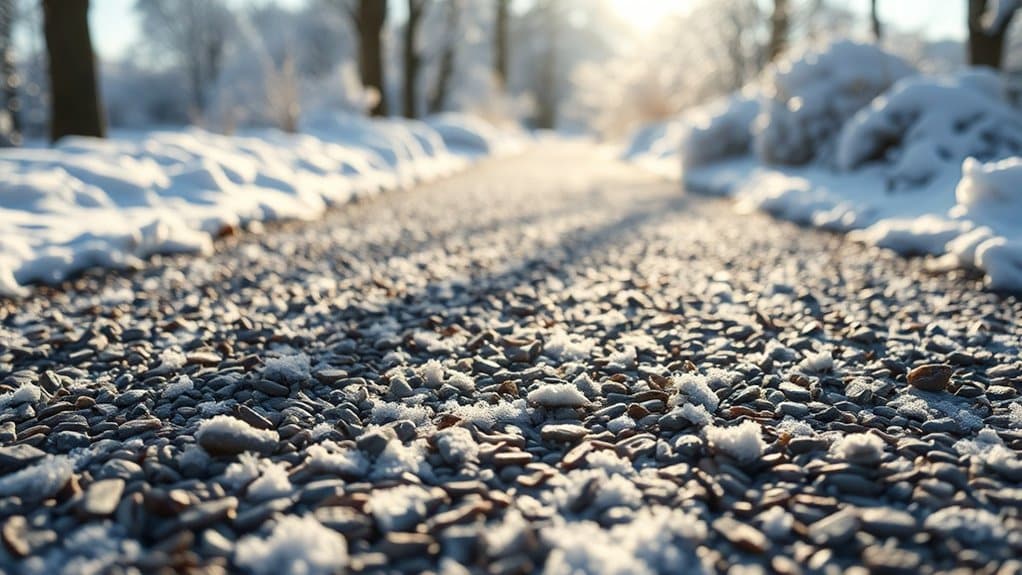
Winter slip resistance for resin-bound gravel depends on two key factors: the surface’s natural grip and any anti-slip additives mixed in.
A well-installed resin surface should handle British winter conditions, much like a proper winter doormat grips your boots. The surface needs proper texture and drainage to stop ice forming – think of it like the treads on your wellies keeping you steady on frosty mornings.
Anti-slip additives work brilliantly for extra grip, particularly on slopes or high-traffic areas where ice is likely to form.
Anti-Slip Surface Properties
Anti-Slip Surface Properties
When British winters bring freezing temperatures, resin-bound surfaces need proper grip to keep people safe. Three key factors make the difference:
- Surface Textures: Rough resin surfaces with stone chips work better than smooth ones, stopping ice from building up too much.
- Anti-Slip Additives: Adding bits of crushed glass or coarse sand to the resin creates a grippier surface – particularly useful for those tricky frosty mornings.
- Regular Maintenance: Simply sweeping away leaves and using proper snow-clearing tools (not metal shovels) keeps the surface in top form for grip.
These measures prove especially valuable for driveways, garden paths and public walkways across the UK, where winter weather can be unpredictable.
Enhanced Winter Safety
Resin-bound gravel surfaces boost winter safety significantly through anti-slip properties and excellent grip in icy weather. The robust structure handles British winters well, providing stable footing for both pedestrians and vehicles.
| Safety Feature | Benefit |
|---|---|
| Anti-Slip Properties | Better grip during frost |
| Permeability | Stops water pooling and ice formation |
| Durable Resin Binder | Won’t damage from snow shovelling |
| Texturizing Materials | Extra grip on slopes and wet patches |
Simple maintenance keeps the surface safe – just sweep regularly and wash gently when needed. If you’re looking to reduce winter slip risks, particularly on driveways or paths, resin-bound gravel proves a practical choice for UK weather conditions.
Effective Drainage Solutions
Effective drainage solutions prove vital for winter safety across the UK, particularly in frost-prone areas. Three key factors matter:
- Porosity: Resin-bound gravel naturally drains water, much like a sponge, stopping ice patches from forming on your path or driveway.
- Surface Integrity: A proper solid base (think of it as your house’s foundations) stops winter freeze-thaw cycles from causing cracks and damage.
- Environmental Impact: Good drainage reduces local flooding risk and helps replenish groundwater levels – particularly important given Britain’s increasingly wet winters.
Mind the installation, though. Poor setup can lead to puddles and ice patches – rather like a badly laid patio that collects water.
Regular checks and proper installation ensure your surface stays safe and slip-free throughout winter.
Importance of Professional Installation

Professional installation of resin-bound gravel is crucial, especially in the UK where frost is common.
Whilst DIY might seem tempting, proper installation by experts ensures your driveway or path stays intact through harsh British winters.
Skilled installers carry out thorough ground assessments and prepare the base correctly – much like building a house with solid foundations.
They know exactly how much aggregate and resin to mix, ensuring your surface won’t crack or lift when temperatures drop below freezing.
The professionals also sort proper drainage (vital for our rainy climate) and maintain consistent depth throughout the surface.
Think of it like laying carpet – you wouldn’t want bumps or dips that could cause problems later.
Getting it right first time saves money in the long run.
A professionally installed resin-bound surface should last years without frost damage, whereas poorly laid surfaces often need costly repairs after just one winter.
Material Properties Contributing to Frost Resistance

Material properties play a vital role in how resin-bound gravel handles frost.
The resin’s elastic nature, much like a rubber band, allows it to flex rather than crack when temperatures drop.
Water passes through easily thanks to its permeable structure, meaning ice is less likely to form and cause damage.
Think of it as a protective coat that moves with the weather rather than fighting against it – quite useful for our British winters.
Resin Elasticity Benefits
Resin Elasticity Benefits
The elastic properties of resin are vital for frost protection, allowing the material to bend and flex during Britain’s frequent freeze-thaw weather cycles.
The key benefits include:
- Natural Flexibility: Like a rubber band, the resin flexes rather than cracks when frozen ground shifts, keeping your surface intact throughout winter.
- Shock Absorption: Think of it as a cushion – the resin soaks up the pressure from frost, preventing unsightly cracks from forming on your driveway or path.
- Cold-Weather Toughness: Quality polyurethane resins stay flexible even in freezing temperatures, unlike concrete which can become brittle and chip.
These elastic qualities make resin-bound gravel particularly well-suited to UK weather conditions, where winter temperatures frequently hover around freezing.
It’s a practical choice for driveways, paths and patios across the country.
Permeability and Flexibility
Resin-bound gravel stands out for its excellent frost protection, thanks to its unique blend of permeability and flexibility. Think of it like a sponge that’s also stretchy – water from rain or melting frost simply drains through rather than forming dangerous ice patches. This makes it particularly useful for British driveways and paths, where winter weather can be harsh.
Unlike concrete or tarmac, which can crack under frost pressure, resin-bound gravel moves with the freeze-thaw cycle, much like a flexible joint. The material expands and contracts naturally, preventing the surface damage often seen in traditional paving during cold snaps.
Its practical benefits are clear: less maintenance, better drainage (especially helpful during our wet winters), and fewer frost-related repairs.
For UK property owners dealing with regular frost, resin-bound gravel offers a durable, low-maintenance solution that handles our climate particularly well.
Comparing Resin-Bound Gravel With Other Surfaces

Comparing Surfaces: Why Choose Resin-Bound Gravel?
Resin-bound gravel outperforms traditional surfaces for UK driveways and pathways, particularly in frosty conditions:
- Durability: Whilst concrete often cracks during winter frost, resin-bound gravel flexes and withstands freeze-thaw cycles without damage.
- Water Drainage: The porous structure lets rainwater drain freely, preventing ice patches commonly seen on tarmac surfaces.
- Safety and Aesthetics: The non-slip surface stays firmly in place, unlike loose gravel that scatters across the drive. It maintains its smart appearance through all seasons.
Though fitting requires cold-weather resin in winter months, the lasting performance and smart look make it worth considering for British weather conditions.
Maintenance Needs in Frost-Prone Areas

Caring for resin-bound gravel in frost-prone areas is straightforward with proper planning.
Use plastic snow shovels rather than metal ones to avoid surface damage, and clear snow as soon as possible.
Skip harsh de-icers and grit, which can block the surface’s drainage and harm the resin. A light sprinkling of rock salt works best – just remember to wash it off once the frost risk has passed.
Keep an eye on your surface throughout winter by checking it regularly. Much like caring for your car in winter, prevention is better than cure.
Quick snow removal stops ice from building up, whilst careful salt use protects the surface without compromising its grip.
These simple steps will keep your resin-bound driveway or path safe and sound through the coldest months.
Longevity of Resin-Bound Gravel in Cold Climates
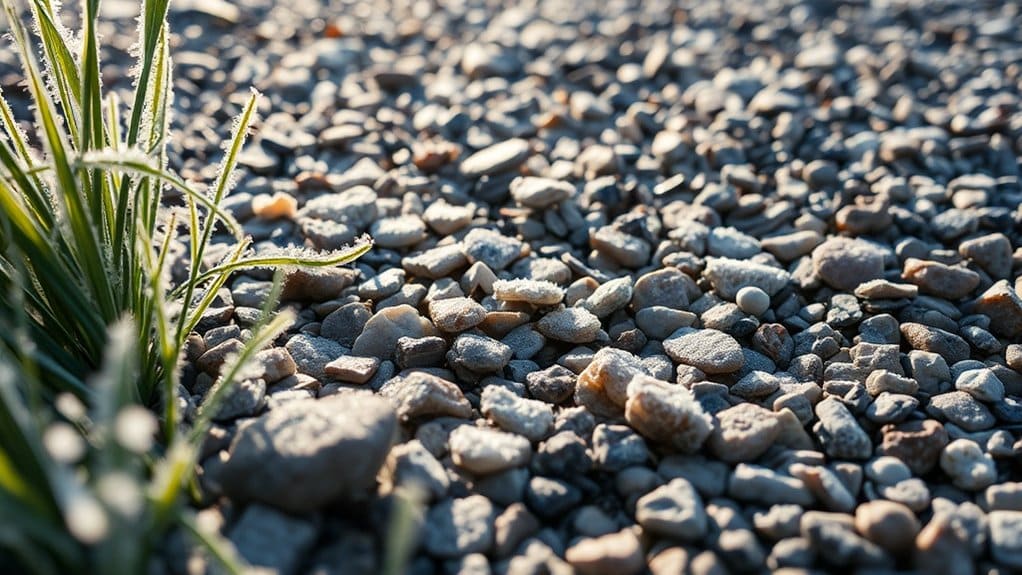
Resin-bound gravel performs remarkably well in Britain’s cold weather, provided it’s fitted properly with our climate in mind.
Three factors make all the difference:
- Material Choice: Frost-resistant resins are essential – think of them like winter tyres for your driveway, helping the surface cope with our freeze-thaw cycles.
- Proper Fitting: Expert installation that accounts for frost depth and water drainage prevents winter damage. Much like laying proper foundations for a house, this groundwork is crucial.
- Setting Conditions: The resin must set at temperatures between 5°C and 25°C – typical British weather conditions most of the year – to ensure it bonds properly and won’t let moisture seep in.
Cost-Effectiveness Over Time
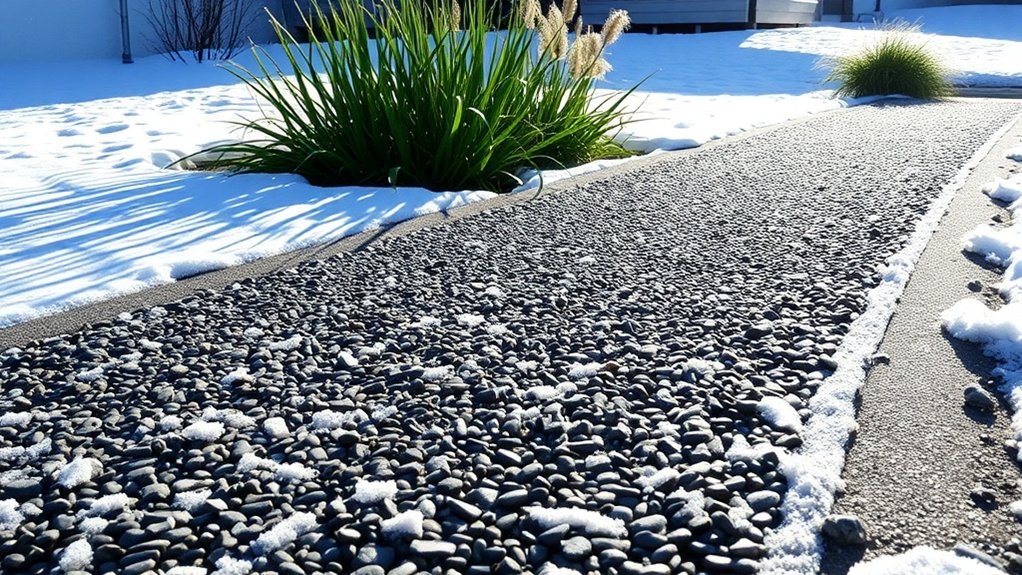
Resin-bound gravel proves cost-effective in British weather, particularly in cold areas.
Though initial costs run £40-60 per square metre, its long-term value shines through minimal upkeep needs. Think of it like a quality winter coat – costlier upfront but lasting years with proper care.
The material handles frost and ice well, meaning fewer repairs than traditional surfaces like concrete. Its flexible nature prevents the usual winter cracking you’d see in concrete driveways, saving on patching costs.
The surface also drains naturally, helping avoid water pooling and potential damage.
For UK homeowners, this means less time and money spent on yearly maintenance.
While the upfront cost may seem steep compared to basic gravel or concrete, the reduced repair bills and longer lifespan make it a smart investment for British properties.
Frequently Asked Questions
How Does Resin-Bound Gravel Compare to Pavers in Winter Conditions?
Resin-bound gravel proves more reliable than pavers during British winters. Its porous surface lets water drain through rather than puddle and freeze, making it less slippery in frosty conditions. Unlike standard block paving, which often suffers from frost damage and lifting, resin-bound surfaces maintain their integrity through freezing temperatures. Think of it like a warm winter coat with breathable fabric – it handles the elements whilst letting moisture escape.
Can Resin-Bound Gravel Be Installed Over Existing Surfaces?
Yes, resin-bound gravel can be laid over existing surfaces, but proper preparation is crucial. The base surface must be stable, clean and dry before installation. Common surfaces include concrete, tarmac and block paving. Think of it like painting a wall – you wouldn’t apply new paint over dirt or flaking paint, as it wouldn’t stick properly. The same principle applies here. A well-prepared surface ensures your resin-bound gravel stays firmly in place and prevents water from getting trapped underneath.
What Colors Are Available for Resin-Bound Gravel Surfaces?
Resin-bound gravel comes in a vast range of colours to suit any property style. Common options include natural tones like beige and grey, whilst mixed blends can create striking effects. Choose warm buff shades to complement traditional stonework, or opt for contemporary charcoal and silver mixes for modern properties. Most suppliers offer colour charts with 20+ options, from classic earth tones to bold statement hues.
Is Resin-Bound Gravel Environmentally Friendly and Sustainable?
Resin-bound gravel offers several environmental advantages whilst remaining a practical choice for UK driveways and pathways. The system uses recycled materials and natural stone, reducing landfill waste and mining impact. Its permeable surface helps with natural water drainage, preventing flooding and supporting local groundwater systems – particularly useful given Britain’s wet climate. The durability of resin-bound surfaces means less frequent replacement, cutting down on long-term resource consumption.
How Long Does the Installation Process Typically Take?
Small installations can be completed in a few hours, whilst larger projects may take several days. Proper planning, having all materials on-site and suitable weather are crucial for a smooth process. For example, fitting a small conservatory might take 4-5 hours, but installing across multiple rooms could stretch to 2-3 days.
Conclusion
Resin-bound gravel stands up remarkably well in the British climate, particularly during frosty weather. The polyurethane resin forms a tough barrier against ice and snow, whilst maintaining excellent drainage to prevent water pooling – a common issue on UK driveways. Much like a good winter coat, the surface provides reliable protection when temperatures drop below freezing. Though it needs occasional upkeep, its durability in cold weather makes it a sound choice for British homes, offering both kerb appeal and practical benefits throughout the year.
